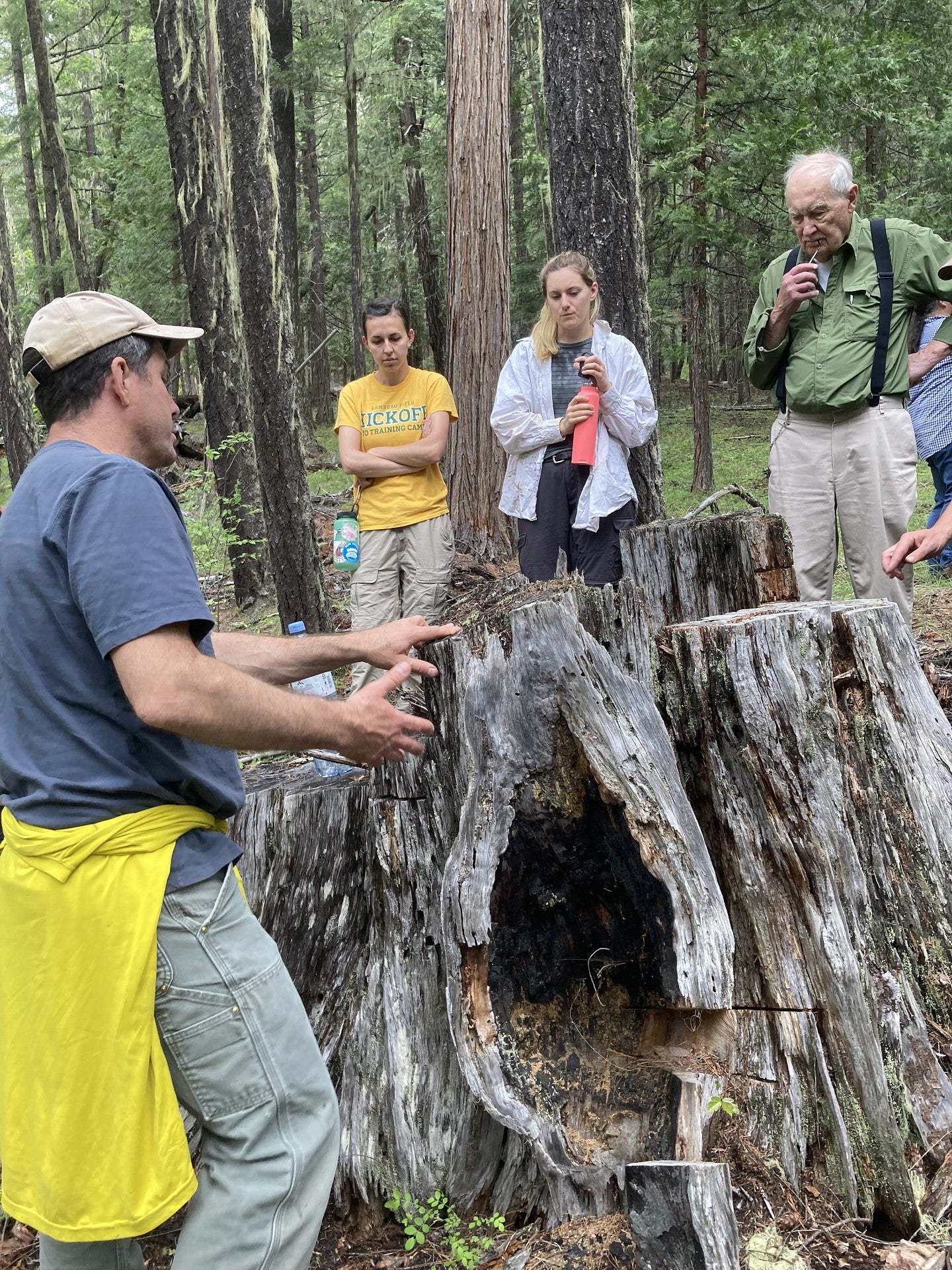Co-producing restorative fire: a transdisciplinary approach to indigenous forest stewardship and the restoration of forest resilience
Research Team | Funding | Publications
Project Summary
Past Indigenous land management and its legacies are not well understood for temperate rainforests in the Pacific Northwest (PNW). Prior to colonization of the area by European peoples, Native Americans successfully stewarded their lands and lived with wildfires for thousands of years. Yet today, wildfires pose a serious socioecological challenge that threatens the resilience of human communities and landscapes across the PNW. Our transdisciplinary investigation fuses theory and methods in ecological and social sciences with Indigenous knowledge and perspectives to understand the nature of historical Indigenous forest stewardship, its legacies, and its potential to contribute to contemporary forest restoration and resilience-based management.
This project is an interdisciplinary collaboration between the University of Oregon, Oregon State University, Tribal Communities in Oregon, and the US Forest Service.
The research asks how traditional management practices such as cultural burning and selective harvesting of natural resources may have contributed to forest health and increased resilience to catastrophic wildfire and changing climate. Past Indigenous land management and its legacies are not well understood for temperate rainforests.

This research contributes to efforts to improve forest resilience by informing forest planners about how people successfully lived with and managed these same hazards in the past, and by showing how such practices could guide contemporary management practices. It also supports Tribal community efforts to preserve and interpret their cultural heritage, and to re-engage in restoration and stewardship of their traditional lands.

Other studies have examined the long term, intertwined history of temperate rainforests and wildfires, but few have focused on records of fires and other cultural activities preserved within the annual growth rings of trees. Still fewer studies have linked these tree ring histories to the traditional harvesting and burning practices of Indigenous peoples - either through oral tradition or by using archaeological evidence. In collaboration with traditional indigenous cultural practitioners, this project integrates tree ring studies and archaeological evidence to reconstruct the history of Indigenous forest management. By synthesizing these diverse sources of information, we will more fully understand how Indigenous cultural practices may have helped build forest health and resilience in the face of potentially catastrophic wildfires. The results will contribute detailed factual evidence that informs current forest management strategies and supports efforts to mitigate the growing threat of extreme wildfires under climate change.
Research Team
Project Director, Michael R. Coughlan, PhD, is an environmental anthropologist and assistant research professor at the Institute for Resilient Organizations, Communities, and Environments (IROCE) at the University of Oregon (UO). mcoughla@uoregon.edu
David G. Lewis, PhD, assistant professor in Anthropology and Ethnic Studies at Oregon State University (OSU), a member of the Confederated Tribes of Grand Ronde, and past Cultural Department and Museum Manager. Learn more about David's research on The Quartux Journal. lewisd@oregonstate.edu
James Johnston, PhD, is a dendroecologist and assistant research professor in the Institute for Resilient Organizations, Communities, and Environments at UO. jamesjohn@uoregon.edu
Kelly M. Derr, PhD, is courtesy research associate at IROCE and a professional archaeologist with over 18 years of experience conducting archaeological and paleoecological studies in the Intermountain West and the Pacific Northwest. kderr@hrassoc.com
Bart R. Johnson, MLA, PhD, is an ecologist and landscape architect, and professor emeritus of Landscape Architecture at the UO. bartj@uoregon.edu
Funding
This project was initiated by a University of Oregon Office of the Vice President for Research and Innovation, Resilience Initiative Seed Grant, " Co-producing restorative fire: a transdisciplinary approach to indigenous fire stewardship and the restoration of forest resilience."
Current funding includes:
- The National Science Foundation's Human-Environment and Geographical Science Program (NSF 2215690), "Investigating historical Indigenous use and management of temperate rainforests."
- The National Endowment for the Humanities' Archaeological and Ethnographic Field Research program (NEH RFW-291993-23), "Culturally Modified Trees in Traditional Landscapes: Documenting the Legacy of Indigenous Foods and Cultural Practices in the Oregon Cascades."
Publications and Other Project Outcomes
Frequent Fire Fact Sheet: Fire in the heart of the Oregon Cascades: exceptional variability in fire across the western Cascades
Coughlan, Michael R., James D. Johnston, Kelly M. Derr, David G. Lewis, Bart R. Johnson (2024). Pre-contact Indigenous fire stewardship: a research framework and application to a Pacific Northwest temperate rainforest. Frontiers in Environmental Archaeology 3.10.3389/fearc.2024.1347571
Johnston, James D., Micah R. Schmidt, Andrew G. Merschel, William M. Downing, Michael Coughlan, and David G. Lewis. "Exceptional variability in historical fire regimes across a western Cascades landscape, Oregon, USA." Ecosphere 14, no. 12 (2023): e4735.
Coughlan, M., D. Lewis, N. Serio, H. Loeb, S. Thompson. 2023. Indigenous fire stewardship for fire management and ecological restoration in the Pacific Northwest, a literature synthesis and annotated bibliography. Technical Report, Ecosystem Workforce Program, Eugene, OR. EWP Working Paper no. 118, University of Oregon.
Petraglia, Grace. 2023. With Trees As My Witness: The Use of Historical Survey Records in Understanding Contact-Era Forest Structure int he Upper Middle Fork Willamette River Watershed. Clark Honors Thesis, University of Oregon
Coughlan, M., K. Derr, J. Johnston, D. Lewis, B. Johnson. 2023. Precontact Indigenous Fire Stewardship: From the Valley to the Forest Symposium, Future Directions for Archaeology and Heritage Research in the Willamette Valley, Oregon. Society for American Archaeology Annual Meeting, Portland, Oregon.
Coughlan, M., Kelly M. Derr, M. Mulligan. 2022. Natural and Cultural features noted on Historical General Land Office Maps for the Central Western Cascades of Oregon.
